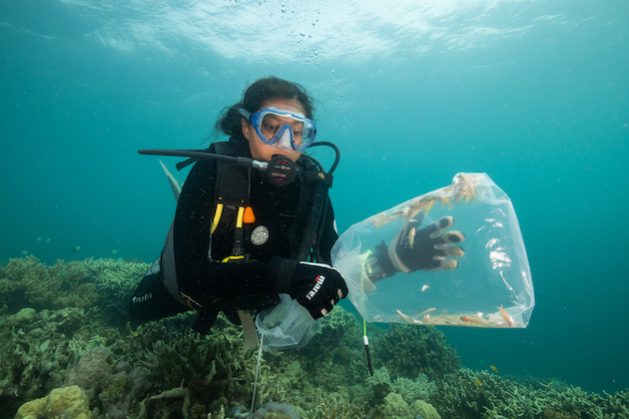
SYDNEY, Jul 19 (IPS) – The Canada-based Ocean Frontier Institute is very clear about the significance of a new collaborative ground-breaking ocean research program. Global warming cannot be effectively tackled, and human life cannot survive on Earth without the ocean.
The ocean covers more than 70 percent of the planet’s surface and absorbs 25 percent of carbon dioxide emissions from the atmosphere, yet there is a critical lack of understanding about the changes occurring in the seas as greenhouse gas emissions increase.
“The ocean has absorbed 90 percent of the excess heat from the atmosphere, but will that continue? We know the ocean is a big factor in climate, but we need a much better level of detail to understand how the ocean is functioning now and how will that change in the future.” Dr Anya Waite, CEO and Scientific Director of the Ocean Frontier Institute told IPS.
The Institute was established by Dalhousie University, Nova Scotia, on Canada’s east coast in 2015 to accelerate global leadership in ocean research with a focus on the North Atlantic Ocean and Arctic Gateway. On 12 May 2023, it launched the Transforming Climate Action (TCA) research initiative with its academic partners, Université du Québec à Rimouski and Université Laval in Quebec and Memorial University in Newfoundland and Labrador.
The Institute describes it as “the most intensive investigation ever into the ocean’s role in climate change.” And it seeks both knowledge breakthroughs and climate action solutions in association with Indigenous communities, including the Mi’kmaq people, custodians of indigenous land and knowledge on Canada’s Atlantic coast.

“Our relationship with the ocean is an ancient one built on balance, respect, and knowledge passed down from generation to generation,” stated Angeline Gillis, Executive Director of the Confederacy of Mainland Mi’kmaq, at the program’s launch. “It will provide a unique opportunity to bring together our common experiences and understandings of the ocean in a partnership that will ensure we move towards a sustainable future for our children.”
Coastal communities in Canada have long depended for generations on the sea and coastal marine life for food, culture and socioeconomic survival.
The world’s ocean is the greatest form of protection against an overheating planet. It removes more carbon dioxide from the atmosphere than all the rainforests and stores 90 percent of the excess heat generated by greenhouse gas emissions. A critical marine organism, phytoplankton, captures carbon dioxide from above the sea’s surface and circulates it to the deep ocean, where it is stored for millennia. And, so, the ocean moderates the effects of global warming and, in turn, determines climate and weather patterns while generating 50 percent of the oxygen we need to breathe.
But, as global temperatures keep rising, scientific data collected from a vast network of submergible floats scattered across the ocean indicates that there are changes occurring in the sea as the amount of carbon dioxide it takes in endlessly grows. This year, scientists recorded the highest temperature of the world’s ocean in 40 years. Waite says there are warning signs about a possible decline in the health of the ocean and its ability to regulate our climate to safe levels.
“We know extreme climate events are becoming more common. The probability is that there will be more extreme events in the future, but climate modellers are currently not able to predict them,” she said.
Fanny Noisette, Professor of Biological Oceanography at the Université du Québec à Rimouski, told IPS that she had witnessed severe levels of deoxygenation in the bottom waters of the sea near the coastal town of St. Lawrence on the Burin Peninsula. This has resulted, for example, in shoals of Northern Shrimps migrating from the deeper ocean to shallower coastal areas where oxygen is more readily available, she said.
“The decrease in some species abundance, such as Northern Shrimps, could lead to the transformation of economic activities and sources of revenue in local coastal communities,” Professor Noisette predicted, adding that “these environmental changes are superimposed on to other local disturbances already happening in coastal zones, such as pollution and invasive species. Management of coastal zones will need to be more rooted in holistic and ecosystem-based approaches.”
The North Atlantic Ocean, which is the largest oceanic carbon sink, is a critical site for climate-oriented research, and the TCA program will draw on the expertise of many disciplines, from oceanography and atmospheric science to maritime law, social science and justice to Indigenous knowledge. It will also include collaboration with 40 national and global partners in industry, government and the non-profit sector.
The program will strive to generate new scientific data that will be critical to making better decisions about climate action. And identify more effective solutions for the planet’s survival, including the development of new technologies to remove the build-up of carbon dioxide in the sea.

Helen Zhang, Canada Research Chair of Coastal Environmental Engineering and Professor of Civil Engineering at Memorial University in St. John’s, Newfoundland, told IPS that micro-algae will be critical to this goal. “Micro-algae widely exist and have the robust capacity to employ a carbon dioxide conversion factory in the cold marine environment, such as the North Atlantic and Arctic gateways,” Zhang explained. Micro-algae convert carbon dioxide to biomass, which “can then be used to generate bio-products, such as bio-surfactants and biofuels, that can support the growth of various ocean industries, such as transportation and fisheries, as an alternative energy source.”
If global warming is not contained, scientists predict that higher sea temperatures will generate more severe marine heat waves, acidification of seawater and bleaching of coral reefs. That, in turn, will have detrimental impacts on marine life, their habitats and ability to breed. Therefore, removing toxic carbon dioxide from the ocean is essential to its long-term health, the survival of marine life and the sustainable lives of coastal communities. Nearly 10 percent of the world’s population, or more than 680 million people, live in low-lying coastal areas of continents and islands.
While global unity and action to limit the planet’s temperature rise to 1.5 degrees Celsius remain in limbo, the Ocean Frontier Institute and its partners are forging ahead with a clear vision and timeline of action. That leadership is fully backed by the Canadian Government, which has contributed $154 million to the ‘Transforming Climate Action’ program through its Canada First Research Excellence Fund. In total, about $400 million has been committed to the TCA research program. And, in line with Canada’s national goal, the Institute is focused on achieving net zero carbon emissions by 2050.
IPS UN Bureau Report
Follow @IPSNewsUNBureau
Follow IPS News UN Bureau on Instagram
© Inter Press Service (2023) — All Rights ReservedOriginal source: Inter Press Service

